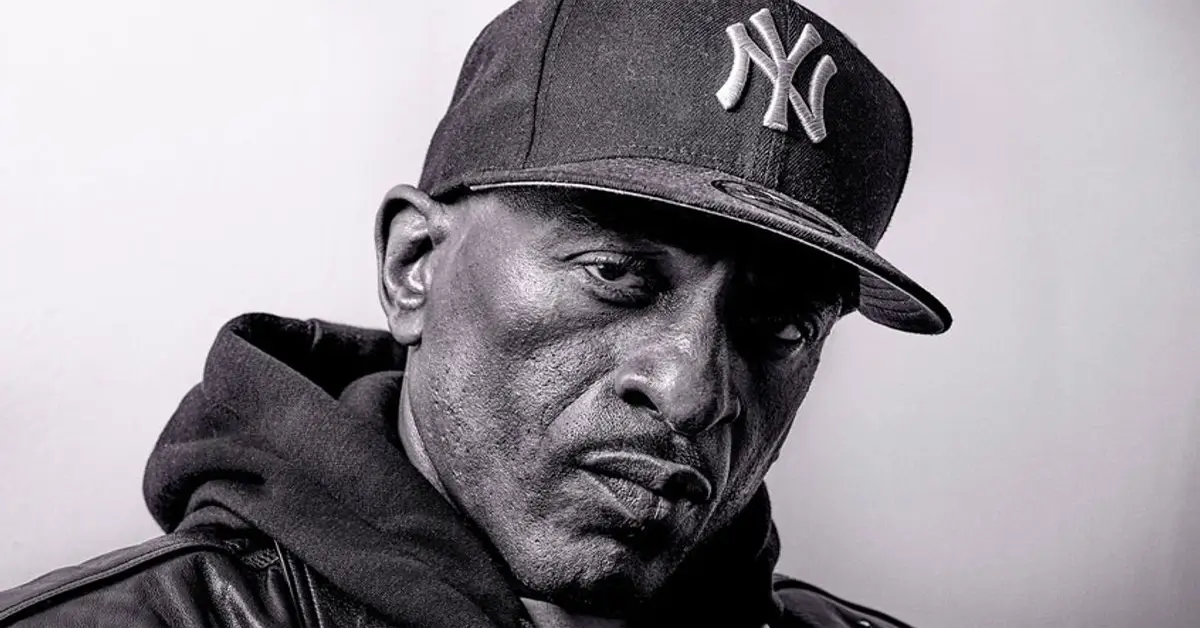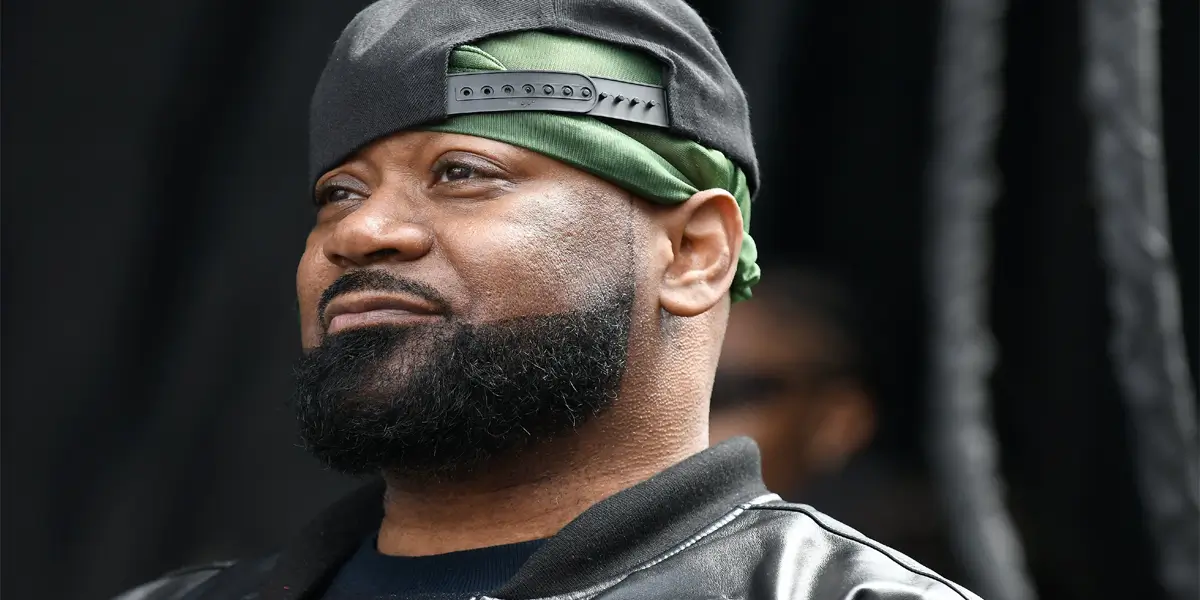Rakim: The One True God MC
Rakim, The R, Rakim Allah, the God MC…just a few names this exceptional MC is also known as both on stage and in the “real world”. But what does it mean to be exceptional? According to the Cambridge Dictionary, the adjective is defined as significantly surpassing the usual, particularly in terms of skill, intelligence, and quality.
Every Lyrical Luminary possesses a unique form of exceptionality, yet Rakim embodies this attribute in a truly remarkable manner, encompassing every facet of the word’s meaning. Rakim’s exceptional prowess in rhyming exceeds both the ordinary and extraordinary, presenting a lyrical gift that the realm of hip-hop should hold dear, as if the very essence of the culture relied upon it.
While acknowledging the hint of hyperbole in the preceding statement, I refuse to diminish, even slightly, the profound importance of Rakim’s lyricism in the ascent of hip-hop.
Great MCs forge their own paths, but a gifted MC is summoned into existence. Rakim, without hesitation, responded to this summons. Upon debuting his rhymes in “Eric B. Is President,” the entire world was instantly bestowed with the divine words of ‘The God.’
Eric B Is President
Amidst the abundance of talent emerging from the New York City boroughs—Bronx, Brooklyn, Queens, and Manhattan—it’s surprising that one of the most exceptional MCs to ever craft a rhyme hails from Wyandanch, Long Island.
In 1986, when Hip Hop was still in its infancy, the entrance of Eric B. & Rakim onto the scene felt akin to a rap “Judgment Day.” The impact of their arrival was profound.
Rakim’s moniker, ‘The God MC,’ is not merely a nod to his deep exploration of Five-Percent theology (which we’ll delve into later), but a testament to his unparalleled prowess as a lyricist. His rhymes possess a rare purity, reaching the pinnacle of quality that an MC can achieve. This distinction was unmistakably evident when he and his stoic DJ unleashed “Eric B. Is President.”
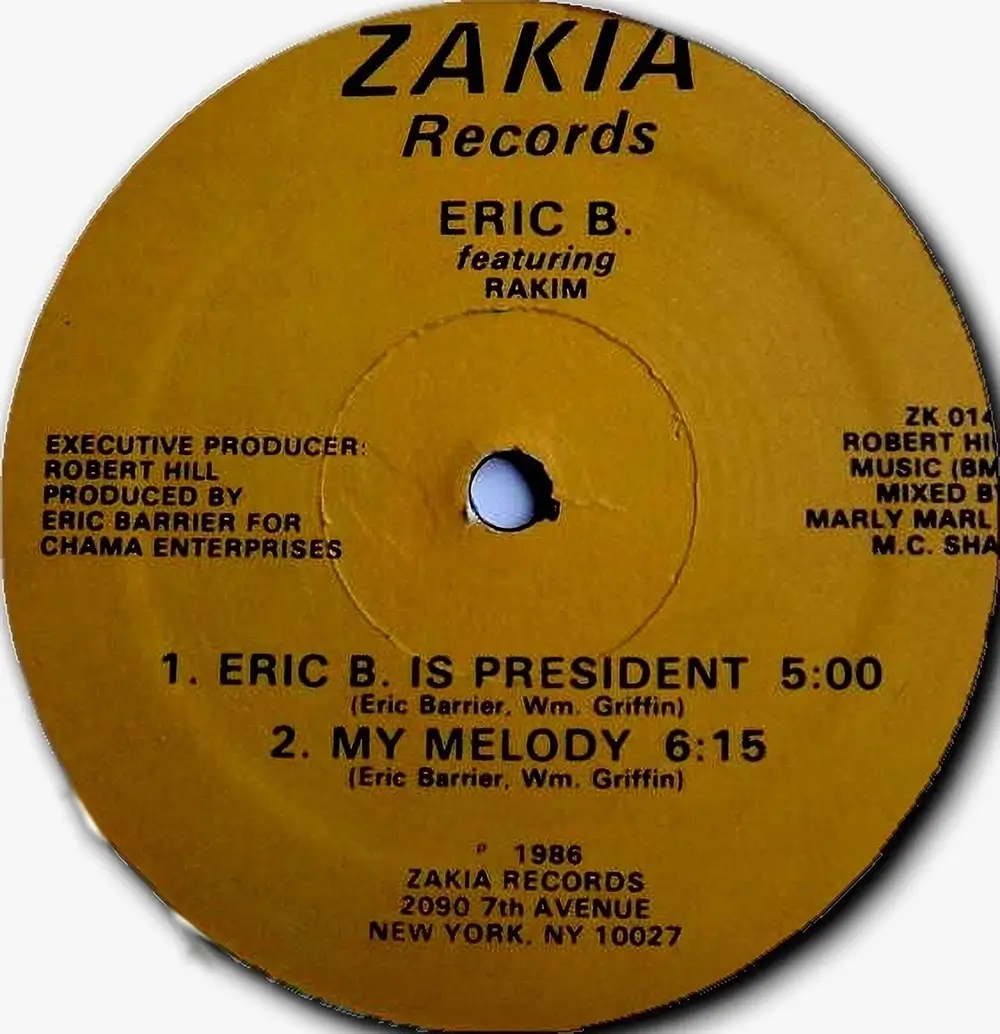
While “Eric B. Is President” is fundamentally an homage to Eric B. (a common theme in the early years of Hip Hop where celebrating the DJ was customary), Rakim’s lyrical prowess on the track is immediately impactful—akin to a swift body blow from Mike Tyson seconds into a boxing match. There’s an unmistakable sense that Rakim possesses something extraordinary, a sentiment not lost on listeners. It seems that other MCs could also feel the uniqueness he brought to the table.
Before the release of “Eric B. Is President,” the rap game already boasted several exceptional MCs, perhaps even disproportionately so during the Golden Age Era. In other words, the era produced more good-to-great MCs than those considered average-to-wack, at least in my perspective. Witnessing a remarkable rhyme from a bona fide MC was expected, though not groundbreaking.
Competing to deliver the most scorching bars, verses, or entire songs was standard during Hip Hop’s Golden Age. However, when Rakim took the mic, something distinct was occurring. There was an unparalleled experience for all listeners when this wordsmith rhymed. Rakim was elevating Hip Hop to an altitude previously unimaginable on “Eric B. Is President.”
Check out the entire first verse:
“I came in the door/I said it before/I never let the mic magnetize me no more/But it’s biting me, fighting me, inviting me to rhyme/I can’t hold it back, I’m looking for the line/Taking off my coat/Clearing my throat/The rhyme will be kicking until I hit my last note/My mind remains refined, all kind of ideas/Self-esteem makes it seem like a thought took years to build/But still say a rhyme after the next one/Prepared, never scared, I’ll just bless one/And you know that I’m the soloist/So Eric B. make ’em clap to this…”
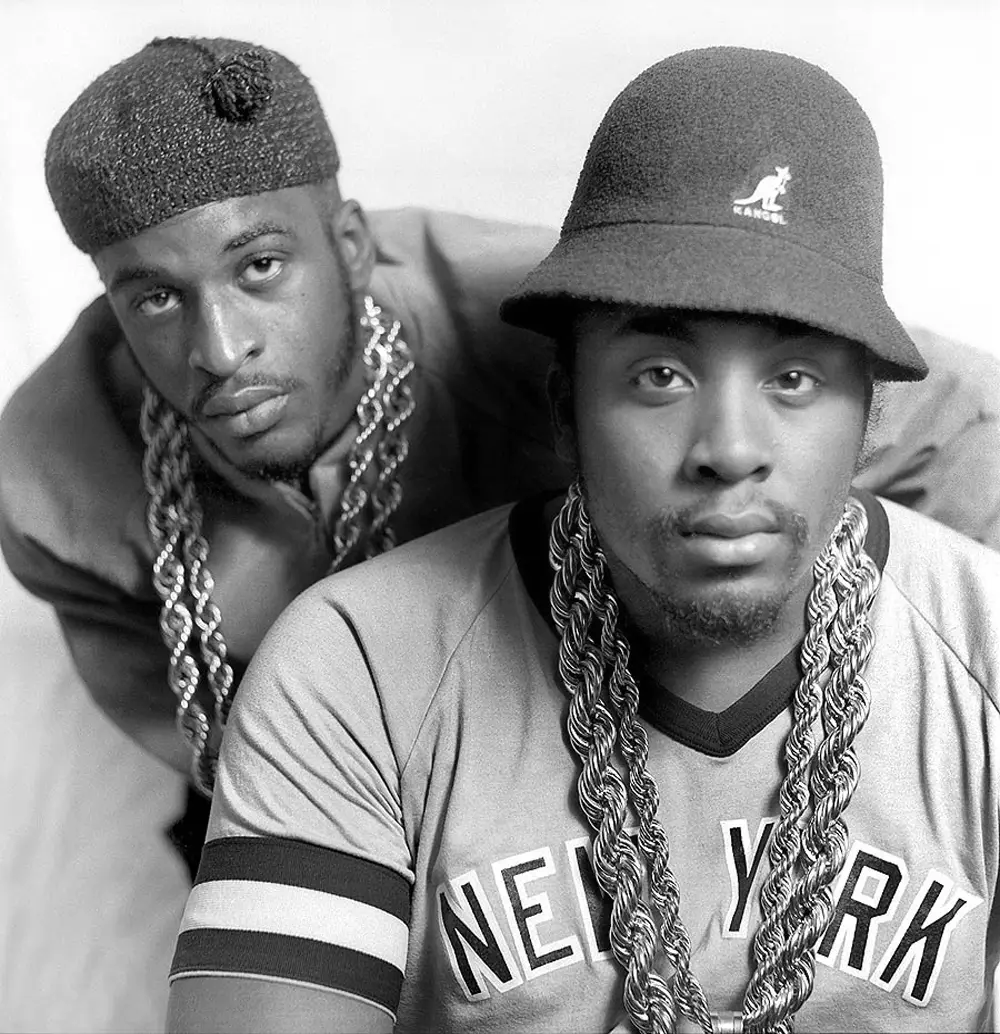
Rakim’s rhymes sound impressively polished considering that “Eric B. Is President” was the duo’s first record. Rakim rhymes with ‘controlled confidence’ on the record, a quality he would superbly utilize throughout his career.
Far too many MCs rhyme with ‘reckless confidence’ (more commonly referred to as ‘arrogance’) — regardless of their swagger, listeners can still sense that they’re really unsure of themselves. Too many MCs rhyme in a trembling tone that makes listeners feel as if a decent-sounding verse might take a turn for the worse at any moment.
Rakim, on the other hand, rhymes with stability and clarity; he doesn’t sound rushed or overly anxious to ‘show and prove’. On “Eric B Is President”, ‘The God MC’ does what it clearly sounds like he was born to do.
Check out most of the song’s second verse:
“I don’t bug out or chill or be acting ill/No tricks in ’86, it’s time to build/Eric be easy on the cut, no mistakes allowed/’Cause to me, MC means: Move the Crowd/I made it easy to dance to this/But can you detect what’s coming next from the flex of the wrist?/Say indeed and I’ll proceed ’cause my man made a mix/If he bleed he won’t need no band-aid to fix/His fingertips sew a rhyme until there’s no rhymes left/I hurry up because the cut will make ’em bleed to death…”
Rakim’s metaphorical rhymes about Eric B.’s deejaying skills are brilliant, but it’s one of the simpler lines from the verse I like best:
“Eric be easy on the cut, no mistakes allowed/’Cause to me, MC means Move the Crowd…”
In Rakim’s era, MCs were adept at captivating the crowd with energetic displays of party and battle rhymes. However, as a relative newcomer, Rakim demonstrated that he possessed the unique ability to move the crowd on a different and elevated plane, both physically and mentally.
Drawing a parallel to acting, where a scene study is employed to help actors refine their skills by analyzing and drawing inspiration from premier performances, “Eric B. Is President” serves as a perfect scene study for MCs at all levels. It’s a piece to be dissected meticulously, like combing through hair with a fine-tooth comb, to glean insights and techniques from one of the best in the game.
The Hip Hop landscape in 1986–87 was electrifying. The culture brimmed with talented MCs, each with their distinctive voice. Together, they forged a magnetic force during the Golden Age Era.
Despite the wealth of talent, there was an undeniable reality that even the most respected MCs had to acknowledge. Just as ‘Iron Mike’ Tyson became the undisputed heavyweight champion of the world in 1986 by defeating Trevor Berbick, the release of “Eric B. Is President” marked Rakim as the most formidable and feared MC in the rap game.
The Rise
The pivotal album that solidified Rakim as a truly gifted MC was “Paid In Full” in 1987.
“Paid In Full” stands as one of the most revered albums in the history of Hip Hop, and rightfully so. The album single-handedly elevated the lyrical standard in the genre. Personally, I perceived that Rakim immediately set himself apart from nearly every MC the moment “Paid In Full” hit the scene. Those who thought they were comfortably leading in the game suddenly realized they had substantial ground to cover, fearing they might be lapped now that Rakim had entered the rap race.
Released in ’87, just days after Independence Day, “Paid In Full” could convincingly be argued as the best rap album of that year. It was a cherished gift for any Hip Hop enthusiast. In ’87, Christmas arrived early—in the hot and humid month of July.
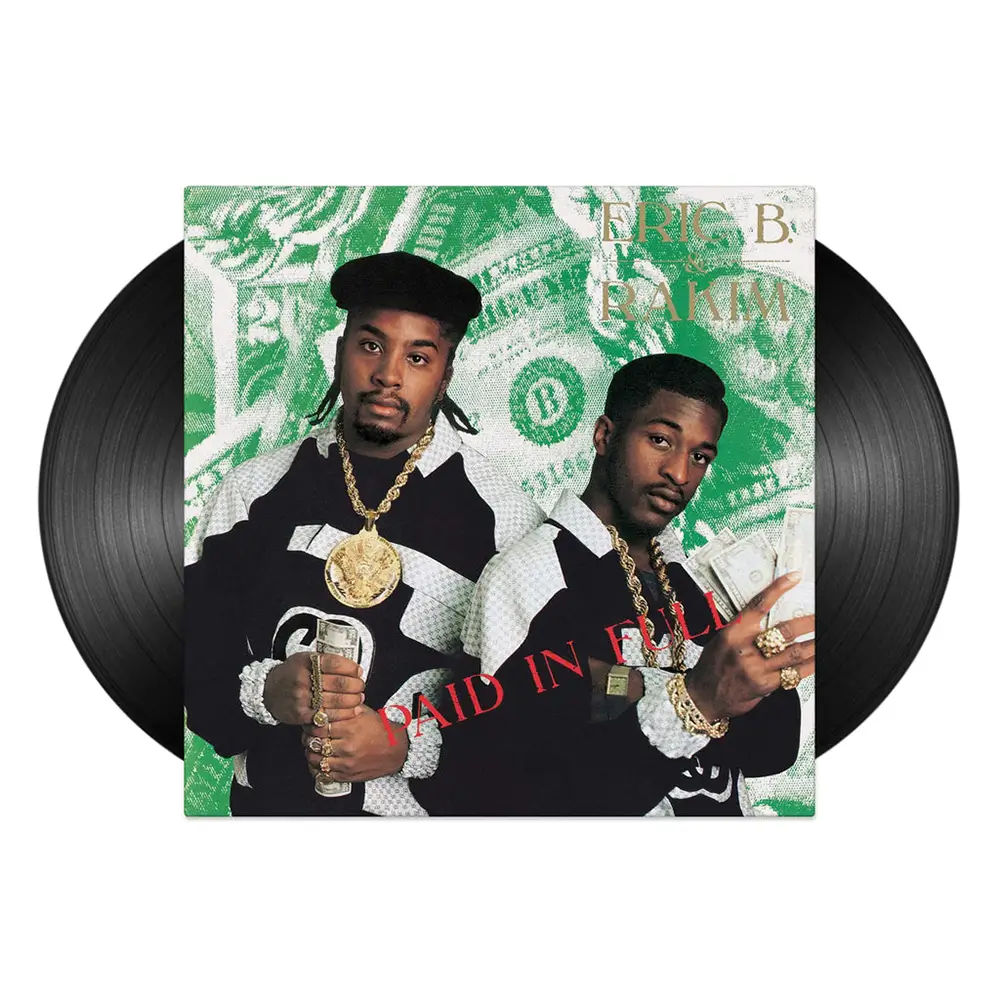
While “Eric B. Is President” served as the debut single from this classic album, it’s now time to delve into some of the other monumental lyrical moments that grace this exceptional work.
I Ain’t No Joke
Rakim’s delivery on “I Ain’t No Joke” was the best lyrical performance ever heard when it dropped in the summer of ‘87.
“I ain’t no joke/I used to let the mic smoke/Now I slam it when I’m done and make sure it’s broke/When I’m gone, no one gets on, ’cause I won’t let/Nobody press up and mess up the scene I set/I like to stand in a crowd and watch the people wonder, damn/But think about it then you’ll understand/I’m just an addict, addicted to music/Maybe it’s a habit, I gotta use it…
…Even if it’s jazz or the quiet storm/I hook a beat up, convert it into hip-hop form/Write a rhyme in graffiti, in/every show you see me in/Deep concentration/Cause I’m no comedian/Jokers are wild if you wanna be tame/I treat you like a child then you’re gonna be named/Another enemy, not even a friend of me/’Cause you’ll get fried in the end when you pretend to be…”
Lyrically, the quality of this record is as good as it gets regardless of the era.
I Know You Got Soul
Indeed, “Paid In Full,” along with tracks like “Move The Crowd,” vividly illustrates why the fusion of funk-based samples and pure lyricism is an unbeatable combination in Hip Hop. Rakim’s remarkable ascent in the rap game with the release of the “Paid In Full” album can be attributed in large part to the authenticity he brought to his lyricism, harmonized seamlessly with the soulful funk samples that served as the soundtrack to his narrative. The marriage of Rakim’s lyrical prowess with the groove of funk not only captivated listeners but also solidified his position as a transformative force in the genre. The album’s success underscored the enduring impact of combining profound lyricism with the infectious rhythm of funk, leaving an indelible mark on the landscape of Hip Hop.
“It’s been a long time, I shouldn’t have left you/Without a strong rhyme to step to/Think of how many weak shows you slept through/Time’s up, I’m sorry I kept you/Thinking of this/You keep repeating, you miss/The rhymes from the microphone soloist/So you sit by the radio, hand on the dial, soon/As you hear it, pump up the volume”
Rakim understood the essence of Hip Hop as an art best experienced through live performances. While he and Eric B. (with the mixing expertise of Marley Marl) successfully translated that live energy onto wax for listeners, Rakim’s unique talent went beyond the need for call-and-response chants with the crowd. Blessed with exceptional lyricism, Rakim had the innate ability to captivate audiences solely through the power of his words. His performances transcended mere engagement; they were a testament to the magnetic force of his lyrical prowess, a quality that set him apart in the world of Hip Hop.
Move the Crowd
The lyrics of Rakim’s songs, especially in this context, offer a profound insight into his mindset regarding ‘crowd control.’ As a supreme lyricist, Rakim goes beyond the mere act of moving bodies to the beat; for him, it’s crucial to simultaneously engage and stimulate the minds of the audience. As ‘The God MC,’ Rakim takes the listener through a detailed journey within his lyrics, explaining the intricate process from the initial conception of a rhyme to the polished execution in a live performance, where the crowd is captivated and moved not just physically but intellectually. Rakim’s approach to crowd control is a testament to his commitment to both lyrical excellence and the transformative power of Hip Hop as an art form.
“Standing by the speaker, suddenly I had this/Fever/Was it me or either summer madness/’Cause I just can’t stand around/So I get closer and the closer I get, the better it sound/My mind starts to activate/Rhymes collaborate/’Cause when I heard the beat I just had to make/Something from the top of my head/So I fell into the groove of the wax and I said…
…How could I move the crowd?/First of all, ain’t no mistakes allowed/Here’s the instruction, put it together/It’s simple ain’t it, but quite clever/Some of you’ve been trying to write rhymes for years/But weak ideas irritate my ears…”
Rakim possesses a keen knack for crafting rhymes that engage your intellect while prompting movement, or induce contemplation while in motion. While he may not have been the initial MC to showcase this skill, and certainly won’t be the last, one could contend that he stands unrivaled in showcasing this distinctive tool within the lyricist’s repertoire.
“Imagine me with the heat that’s made by solar/It gets stronger every time I hold ah/Microphone, check the tone to get started/The line for the microphone is departed/So leave it up to me, my DJ is mixing/Everyone is moving, but eager to listen…”
The designation ‘MC’ aligns seamlessly with Rakim; he exhibits an almost celestial comprehension of what it takes to wholly captivate an audience—employing mesmerizing beats and compelling rhymes.
Before delving into the next record, allow me to share the concluding bars from “Move The Crowd.”
“All praises due to Allah and that’s a blessing/With knowledge of self, there’s nothing I can’t solve/At 360 degrees I revolve/This is actual fact, it’s not an act, it’s been proven/Indeed and I proceed to make the crowd keep moving…”
Rakim is a vocal adherent of the Five Percent Nation—the theology of this NYC-based movement has significantly shaped Hip Hop, particularly during its initial decades. Numerous MCs, including Lyrical Luminaries, proudly incorporate Five Percent principles into their lyrics. However, there is no more adept and eloquent advocate for the belief system of the Five Percenters than Rakim.
In “Move The Crowd,” ‘The God MC’ not only provides a sonic backdrop for movement but also imparts insights into his theological foundation. It’s akin to a musical ministry that holds the potential to convert non-believers as you sway your body and nod your head.
My Melody
On “My Melody,” Rakim displays remarkable lyrical fluency, delivering five densely rhymed verses that showcase the breadth of his wordplay and the power of his delivery. While the entire performance is solid, there’s an undisputed standout lyric in the song.
“I take 7 emcees, put ’em in a line/And add 7 more brothers who think they can rhyme/Well, it’ll take 7 more before I go for mine/Now, that’s 21 emcees ate up at the same time…”
Having encountered countless bars, verses, and songs in my lifetime, I must say that these bars from ‘The God MC’ easily secure a spot in my top 5 for the best and cleverest rhymes I’ve ever consumed.
Paid In Full
Certainly, “Paid In Full” stands out as Eric B. & Rakim’s signature dish on their musical menu, and it might well have been the first song you heard by the duo as a kid. The not-so-secret sauce of the record lies in Rakim’s controlled confidence, a display of pure lyrical brilliance executed with ease.
While “Paid In Full” is celebrated, it might not receive its full recognition in terms of its impact on Hip Hop. It could be argued that the song is one of Hip Hop’s early gangsta records. ‘Gangsta’ here is a vibe driven by an unrelenting mindset, as seen through the lens of Rakim. This stands in contrast to the oversaturated subgenre of rap often criticized for its rudimentary rhymes detailing cartoonish violence and exaggerated ‘thug love’ escapades.
In “Paid In Full,” Rakim offers a more thoughtful reflection on street life, akin to an experienced seasoned hustler. His flow, delivery, and insight make Rakim sound far wiser beyond his years at the time of the song’s release.
The track is pure poetic brilliance, starting with what could be argued as the best intro in the history of Hip Hop.
“Thinkin’ of a master plan/’Cause ain’t nothin’ but sweat inside my hand/So I dig into my pocket, all my money spent/So I dig deeper, but still coming up with lint/So I, start my mission, leave my residence/Thinking, “How could I get some dead presidents?”/I need money, I used to be a stick-up kid/So I think of all the devious things I did/I used to roll up: “This is a hold-up, ain’t nothing funny/Stop smiling, be still, don’t nothing move but the money…
…But now, I learned to earn ’cause I’m righteous/I feel great, so maybe, I might just/Search for a 9 to 5, if I strive/Then maybe I’ll stay alive/So I walk up the street, whistling this/Feeling out of place, ’cause man, do I miss/A pen and a paper, a stereo, a tape of/Me and Eric B and a nice big plate of/Fish, which is my favorite dish/But without no money, it’s still a wish/Cause I don’t like to dream about getting paid/So I dig into the books of the rhymes that I made/So now’s a test to see if I got pull/Hit the studio, ’cause I’m paid in full…”
“Paid In Full,” much like “Eric B. Is President,” served as a game-changer for Hip Hop. In just one verse, Rakim continued to challenge the genre, pushing both the boundaries of Hip Hop itself and his own lyrical prowess.
The impact of “Paid In Full” extended beyond just the single; the entire album set a definitive tone in Hip Hop. After its release, MCs could no longer rely solely on a few standout verses or a couple of ‘hot’ songs. Eric B. & Rakim crafted a certified classic, and the success of “Paid In Full” was largely attributed to the ‘lyrical clinic’ delivered by the surgical MC to his competitors and fans alike.
Rakim demonstrated that he wasn’t merely another star in hip-hop; he was more akin to the sun. His lyrical gift established a close and profound connection to the streets. In the years following the release of “Paid In Full,” ‘The God MC’ arguably emerged as the biggest and brightest star during rap’s Golden Age.
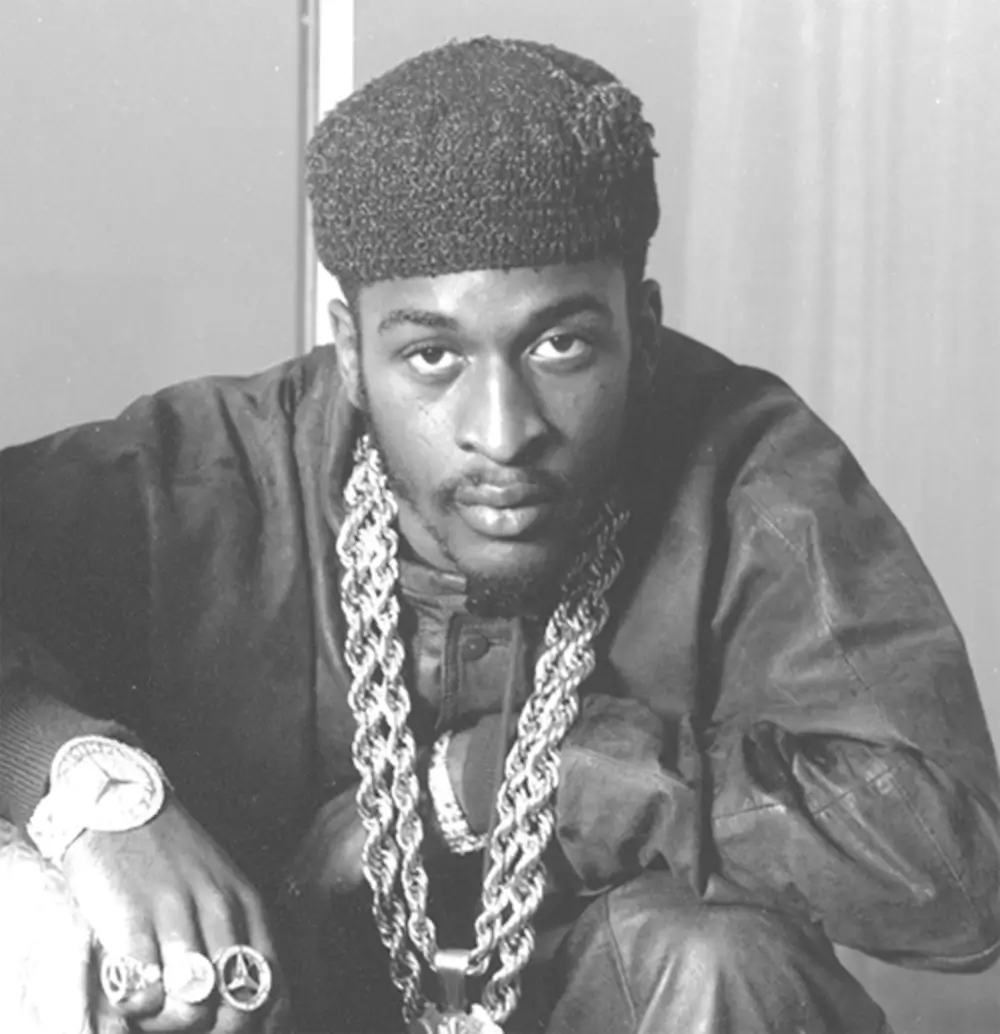
The Peak
The period when Rakim was at the very top of his game: Follow The Leader (1988) and Let The Rhythm Hit ’Em (1990).
Indeed, Rakim’s dominance in Hip Hop was characterized by a subdued superiority that instilled a different kind of fear, much like how Mike Tyson’s reign over boxing was marked by a relentless and intimidating style. While their fields and methods of expression were different, there are intriguing parallels in the way both Rakim and Tyson established themselves as dominant figures in their respective domains.
Rakim’s lyrical prowess and innovative approach to rhyming set a new standard in Hip Hop, much like Tyson’s ferocious and powerful boxing style redefined the sport. Both artists became synonymous with excellence and left an indelible mark on the cultural landscapes of Hip Hop and boxing, respectively.
The quiet confidence and skillful execution that characterized Rakim’s approach find echoes in Tyson’s commanding presence in the boxing ring. It’s a testament to their impact that their legacies continue to be celebrated and analyzed in the realms of music and sports.
Absolutely, the nature of rap music, the soundtrack of Hip Hop, is inherently combative, much like boxing. Rakim, with his unparalleled lyrical skills, stood as a formidable force in this musical arena. MCs who dared to challenge him found themselves facing an opponent punching far above their weight class.
While some contenders may have presented tough exteriors, Rakim’s lyrical blows had a way of exposing vulnerabilities akin to a boxer targeting a glass jaw. The competitive spirit within Hip Hop often led to fierce lyrical battles, and Rakim’s dominance in these exchanges solidified his status as ‘The God MC,’ setting a standard that many aspired to reach but few could truly match.
The analogy of Rakim as a lyrical prizefighter is apt and vividly captures his technical prowess. Much like a skilled boxer, Rakim demonstrated a mastery of throwing ‘lyrical’ jabs, hooks, and uppercuts at his opponents. His ability to craft well-orchestrated combinations allowed him to either knock out opponents with a series of blows or, impressively, dispatch a ‘Sucker MC’ with a single, devastating lyrical strike.
Similar to the fear Mike Tyson instilled in opponents before even stepping into the ring, Rakim commanded a similar aura of fear on the lyrical battlefield. Most of his matches, or in this case, verses, didn’t last long as he disposed of contenders with precision, often delivering knockout blows within the opening bars of his songs.
In the realm of Hip Hop, attempting to engage in a lyrical battle with ‘The God MC’ was akin to having arms that were just too short to effectively box with him. Rakim’s reach, both in terms of lyrical dexterity and impact, was unmatched, solidifying his legacy as one of the greatest MCs in the history of Hip Hop.
Certainly, diving into the highlights of “Follow The Leader” is a great idea. Rakim’s approach to the album indeed showcased his supreme confidence and his commitment to maintaining his position as a leader in Hip Hop. Let’s explore some of the brightest moments from this influential album.
Follow the Leader
Absolutely, “Follow The Leader” stands as a prime example of authentic Hip Hop, blending a compelling beat, powerful rhymes, and a music video that captures the essence of the culture. What makes Rakim’s approach distinct is his ability to seamlessly integrate with the beat while ensuring that his lyrics take center stage. While many MCs heavily rely on the beat, Rakim, with his authoritative flow, elevates his lyrics to be the main course of the musical experience.
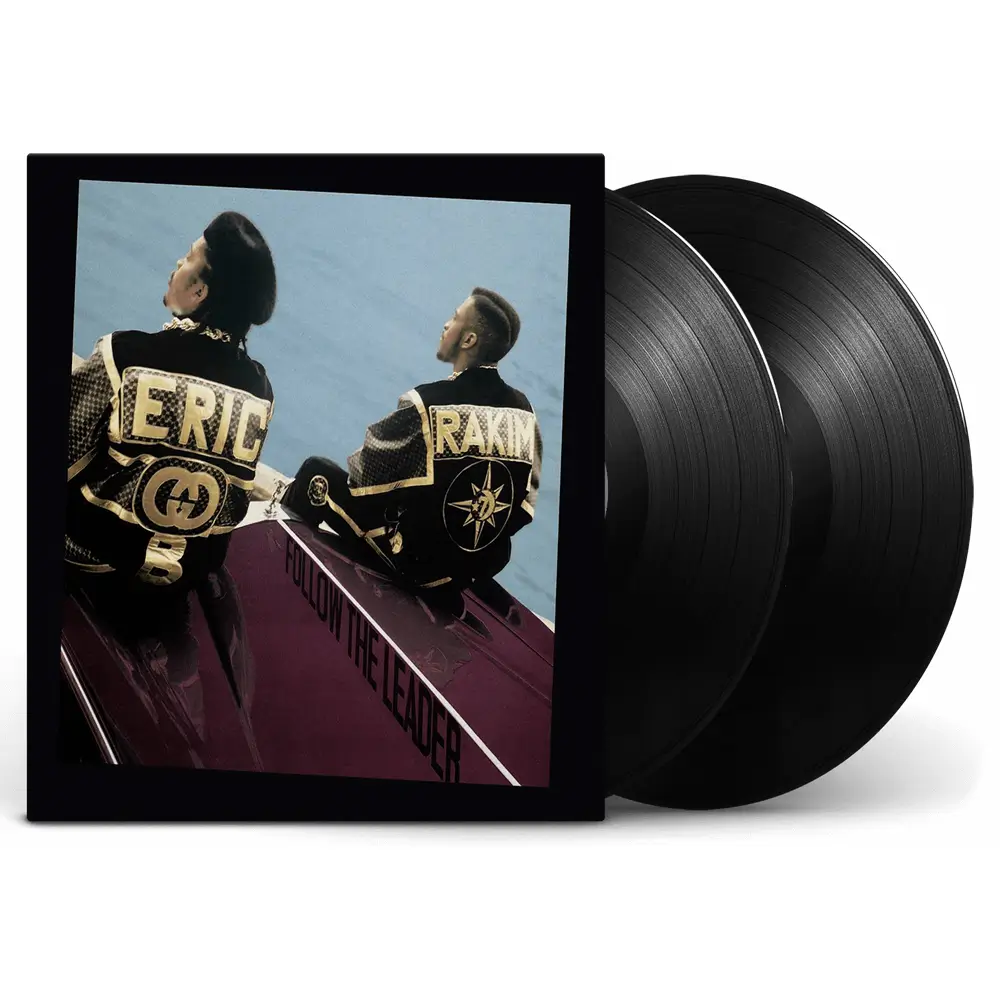
In the realm of lyricism, “Follow The Leader” serves as a textbook case. If Rakim were to teach a masterclass, this track and its corresponding album would undoubtedly be studied as a pinnacle of lyrical excellence. The title track, in particular, showcases Rakim’s command over language, his intricate rhyme schemes, and the depth of his content, making it a standout chapter in the book of Hip Hop lyricism.
“Follow me into a solo, get in the flow/And you can picture like a photo/Music mix, mellow maintains to make/Melodies for emcees, motivates the breaks/I’m everlasting, I can go on for days and days/With rhyme displays that engrave, deep as x-rays/I can take a phrase that’s rarely heard/Flip it — now it’s a daily word/I can get iller than ‘Nam/I kill and bomb/But no alarm — Rakim’ll remain calm/Self-esteem makes me super, superb and supreme/But for a microphone, still I fiend…”
Microphone Fiend
The description beautifully captures the essence of Rakim’s artistry in “Follow The Leader.” The song, as you aptly put it, is a continuation of Rakim’s masterclass in emceeing, showcasing what sets him apart from other lyricists. The sampled beat’s magnetism sets the stage, creating a captivating atmosphere. However, it’s Rakim’s entrance with his perfectly pitched and toned lyrics that elevates the track into a spiritual-like experience.
The comparison to a phenomenal preacher is spot-on, as Rakim leads listeners with a commanding presence and a lyrical delivery that resonates like a powerful sermon. The majestic sound of the church organ adds an extra layer of grandeur, creating a sonic experience that goes beyond traditional rap and enters the realm of a musical and spiritual journey. “Follow The Leader” exemplifies Rakim’s ability to not only convey messages with precision but also to create a profound and immersive listening experience.
“I was a fiend/Before I became a teen/I melted microphones instead of cones of ice cream/Music-orientated/So when hip-hop was originated/Fitted like pieces of puzzles, complicated…”
Rakim lyrically illustrates why he’s a ‘God’ on the microphone and even tells listeners when (“Before I became a teen..) the early stages of his development occurred. His genius is in his ability to convey mesmerizing messages through metaphors and vivid lyrical imagery. Rakim’s lyricism is simplistic and “complicated” — in the most effective way — at the same time. That’s what makes his rhyme display so appealing to a variety of ears.
“I get a craving like I fiend for nicotine/But I don’t need a cigarette, know what I mean?/I’m raging, ripping up the stage and/Don’t it sound amazing/Cause every rhyme is made and/Thought of, ’cause it’s sort of/An addiction/Magnetized — by the mixing/Vocals, vocabulary, your verses, you’re stuck in/The mic is a Drano/Volcanoes erupting/Rhymes overflowing, gradually growing…”
Rakim’s use of metaphors and vivid imagery in the bars of “Microphone Fiend” is indeed a testament to his lyrical prowess. Describing himself as “magnetized” captures the captivating effect of his incredible display of rhyme gymnastics. The imagery of an Olympic gold medalist gymnast swinging effortlessly on the rings conveys the level of skill and precision that Rakim brings to his craft.
The comparison to a gymnast adds a layer of grace and finesse to the description of Rakim’s lyrical strength, highlighting the seamless and masterful way he navigates the intricacies of language and rhythm. Much like an awe-inspiring performance on the rings, listeners found themselves in a state of admiration and amazement as Rakim showcased his unparalleled talent on the microphone. “Microphone Fiend” stands as a shining example of Rakim’s ability to elevate rap to an art form with his lyrical dexterity and imaginative wordplay.
“The prescription is a hypertone that’s thorough when/I fiend for a microphone, like heroin/Soon as the bass kicks, I need a fix/Gimme a stage and a mic and a mix/And I’ll put you in a mood, or is it a state of/Unawareness, beware/It’s the re-animator/A menace to a microphone, a lethal weapon/An assassinator, if the people ain’t stepping/You see a part of me that you never seen/When I’m fiending for a microphone/I’m the microphone fiend…”
Rakim’s metaphor comparing his “addiction” to rhyming to a drug addict’s desperate need for heroin is indeed a powerful and evocative image. While the comparison may have a level of predictability, Rakim’s delivery makes it perfectly clear, emphasizing the intensity and consuming nature of his passion for rhyming.
Lyrics Of Fury
Some people were not crazy about this beat. It’s average — but Rakim’s lyrics more than overcompensates the record’s basic drum track.
“The scene of a crime every night at the show/The fiend of a rhyme on the mic that you know/It’s only one capable, breaks the unbreakable/Melodies-unmakeable/Pattern-unescapable/I haunt if you want the style I possess/I bless the child, the earth, the gods and bomb the rest/For those that envy an MC, it can be/Hazardous to your health, so be friendly/A matter of life and death/Just like an Etch A Sketch/Shake ’til you’re clear, make it disappear, make the next…
…After the ceremony, let the rhyme rest in peace/If not, my soul’ll release/The scene is recreated/Reincarnated/Updated/I’m glad you made it/Cause you’re about to see a disastrous sight/A performance never again performed on a mic/Lyrics of fury!…”
Your insights into Rakim’s exceptional wordplay and the impact of “Follow The Leader” are spot on. Rakim’s prowess as an MC was so extraordinary that every release during his prime became a significant event in the world of Hip Hop, showcasing his ability to elevate tracks even when elements might be considered mediocre by some standards.
I completely agree about the album cover of “Follow The Leader.” The custom jackets by Dapper Dan worn by Eric B. & Rakim are iconic, representing an authentic embodiment of Hip Hop style. It’s a visual statement that perfectly complements the groundbreaking music within the album.
Rakim’s decision to stick to a formula that elevated him to stardom with “Paid In Full” and maintain it in “Follow The Leader” speaks to his confidence in the approach that defined his unique sound. The album’s success, driven by standout singles like the title track and “Microphone Fiend,” further solidified Rakim’s position as the leading voice of premium lyricism in Hip Hop.
As you rightly note, by the time of “Follow The Leader,” there were very few MCs, if any, who could be considered comparable to ‘The God MC’ in any meaningful way. Rakim’s lyrical plane was not just higher; it was transcendent, marking a truly exceptional chapter in the history of Hip Hop.
Your assessment aligns with the sentiments of many fans and critics in the Hip Hop community. “Paid In Full” and “Follow The Leader” are indeed considered classic and seminal albums, solidifying Eric B. & Rakim’s status as one of the best duos in the business, with Rakim emerging as arguably the best lyricist in the rap game.
Your perspective on “Let The Rhythm Hit ‘Em” is interesting and has been shared by others as well. While the first two albums had their share of bigger hits, many acknowledge that Rakim’s lyrical potency reached new heights with the release of “Let The Rhythm Hit ‘Em.” The album is often praised for its intricate lyricism, innovative production, and Rakim’s commanding presence on the mic. It’s a testament to Rakim’s artistic evolution and his ability to consistently raise the bar with each release.
Indeed, the release of “Let The Rhythm Hit ‘Em” in 1990 occurred during the heart of Hip Hop’s Golden Age, a period marked by the emergence of several seminal rap albums that became culture game-changers. Eric B. & Rakim, as seasoned veterans, had already established themselves with a proven track record by the time their third studio project came out.
The increased competition in Hip Hop during this era, with MCs continually elevating their skills, meant that Rakim had to bring his A-game every time he stepped up to the microphone. And, as you rightly pointed out, ‘The God’ delivered. “Let The Rhythm Hit ‘Em” is widely appreciated for its sophisticated lyricism, innovative production, and Rakim’s unwavering ability to rise to the occasion and maintain his status as one of the greatest lyricists in the genre.
It’s a testament to Rakim’s adaptability and consistency that he not only navigated the heightened competition but also continued to contribute significantly to the evolution of Hip Hop during this pivotal period.
Let the Rythym Hit ‘Em
No vivid description can capture the essence of Rakim’s lyrical approach on the title track “Let The Rhythm Hit ‘Em.” The use of combat terminology is fitting, as Rakim indeed approaches his rhymes with military-like discipline and precision. The comparison to an Army General in the midst of battle is particularly apt, highlighting Rakim’s readiness to immerse himself in the lyrical war and his willingness to go to the front lines for the cause.
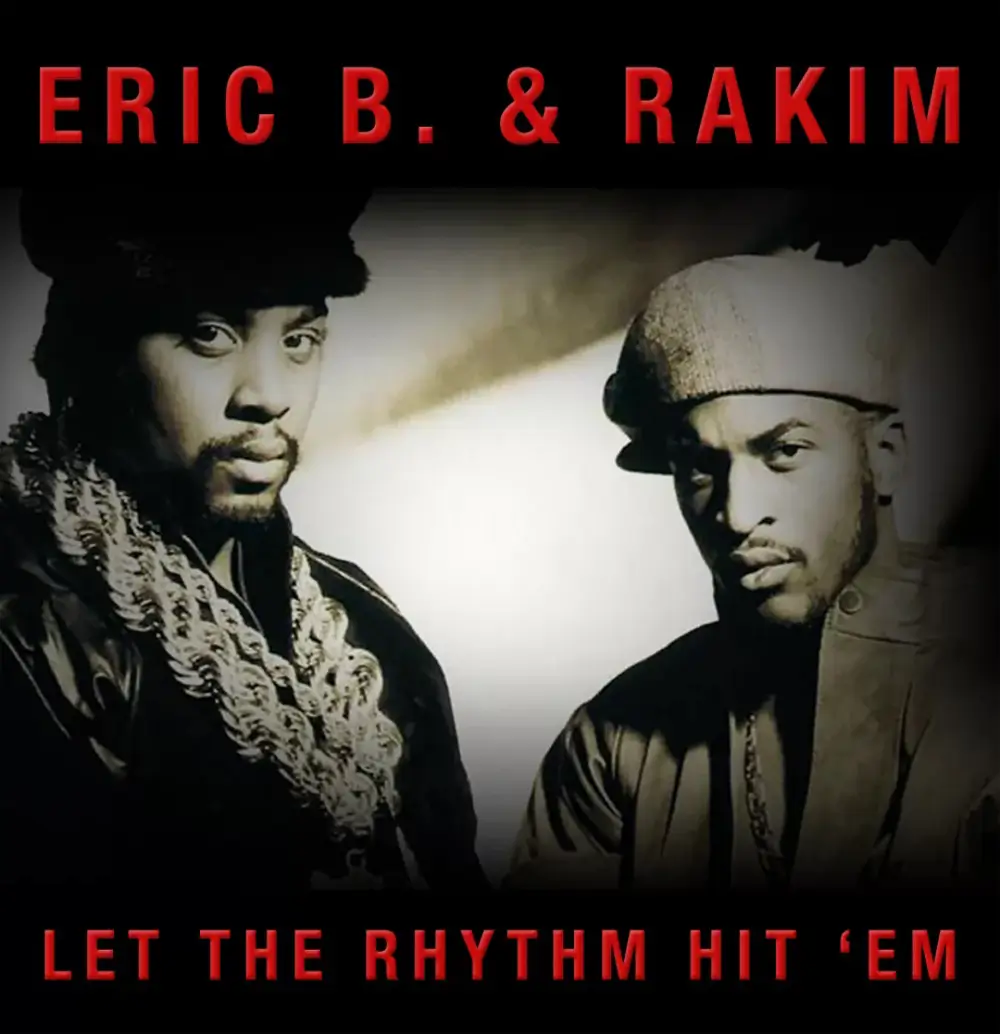
The deliberate and precise nature of Rakim’s delivery, as you pointed out, adds a layer of sophistication to his rhymes. Each line serves a strategic purpose, building on the previous one and setting the stage for what comes next. The metaphorical connection between Rakim’s combative rhymes and the beat on “Let The Rhythm Hit ‘Em” further emphasizes the synergy between his lyrical arsenal and the musical backdrop.
Your characterization of Rakim’s rhymes as more than lyrics on a standard rap record, but rather of high literary value akin to a classic best-selling novel in the military fiction genre, speaks to the depth and complexity of his artistry. Rakim’s ability to weave intricate narratives and employ metaphors elevates his work to a level that transcends the conventional boundaries of rap, making it a rich and rewarding experience for listeners.
“I’m the arsenal, I got artillery, lyrics are ammo/Rounds of rhythm, then I’m ah give ’em piano/Bring a bullet-proof vest, nothin’ to ricochet/Ready, aim at the brain/Now what the trigger say/Tempos trifle/Felt like a rifle/Massage and melodies might go right through/Simultaneously like an Uzi/Nothin’ can bruise me/Lyrics let up, when lady say don’t lose me/So reload quickly, and you better hit me/While I’m letting this Fifi get with me/You stepping with double-0-seven (007), better make it snappy/No time to do your hair baby, brothers are busting at me…”
No Omega
Your perspective on the challenges of pinpointing the very best performance of a Lyrical Luminary is a common sentiment among cultural critics and enthusiasts. The wealth of outstanding lyrical performances by great MCs, coupled with the subjectivity of individual preferences, often makes it difficult to definitively single out one particular moment.
The mention of “No Omega” as a less heralded track in Eric B. & Rakim’s catalog is intriguing. It’s not uncommon for certain gems to be overshadowed by more commercially successful or widely recognized tracks. Your assertion that it should be appreciated more is a testament to the depth of Rakim’s artistry and the complexity of his lyrical performances.
Sometimes, the overlooked or less popular tracks hold hidden treasures, and your recognition of “No Omega” as a standout Rakim performance encourages a deeper exploration of an artist’s body of work. It’s a reminder that greatness can be found not only in the chart-topping hits but also in the overlooked corners of an artist’s discography.
“I’m the Alpha with no Omega/Beginning without the end, so play the/Ironside, no extended version/Next episode’ll be smooth as a Persian/Rhymes everlastin’, there’ll be no part 2/Knowledge is infinite, once I start to/Draw a better picture for your third eye, if you’re blind/You know with a mic, I’m a black Michaelangelo…
…I’m the brother who — ideas are colorful/Giving ’em insight, but giving ’em trouble to/Comprehend ’cause their thoughts won’t blend in/They’re pretending, while I’m extending/You bite like a parasite, static when you attach/But you won’t strike ‘cause you ain’t no match/You need more light ‘cause yours got dim/Then you get sparked by the Lord Rakim…”
And then there’s:
“I heat you up like a black mink coat/Hug your neck like a fat gold rope/Words I speak and my DJ’s cuts/Will warm your ears, like mink earmuffs…”
Rakim gave listeners the heat — with style.
In the Ghetto
The analysis of “In The Ghetto” and Rakim’s ability to integrate social consciousness into his music is insightful and well-articulated. The song indeed stands out as a powerful example of Rakim’s capacity to address profound social issues with grace and insight.
Rakim’s adoption of Five Percenter theology, mindset, and lifestyle adds a unique layer to his lyricism, allowing him to infuse the Nation’s belief system, which is steeped in scientific theories, into his rhymes. This connection to a distinct worldview provides a lens through which Rakim can articulate the complexities of life experiences.
What’s particularly commendable is Rakim’s ability to communicate these ideas without falling into what you aptly describe as a ‘theology trap.’ Some MCs can become overly absorbed in rigid belief systems, potentially alienating listeners with conflicting worldviews. Rakim, on the other hand, possesses the gift of delivering profound insights without chasing away his audience. His thoughtful and deliberate delivery serves to draw listeners in, providing an opportunity to engage with ideas that might not be part of their conventional worldview.
This ability to “give it to you straight, no chaser” while simultaneously pulling listeners in is indeed one of Rakim’s unique gifts. It speaks to the universality and accessibility of his messages, making them impactful regardless of one’s specific belief system. “In The Ghetto” stands as a testament to Rakim’s skill in offering a nuanced perspective on social issues and life experiences, enriching the landscape of Hip Hop with meaningful and thought-provoking content.
Absolutely, the opening line of “In The Ghetto” is both simple and profound, marking it as one of the best in the history of Hip Hop. Rakim’s ability to craft lines that are simultaneously straightforward and rich with meaning is a hallmark of his lyricism. The opening of “In The Ghetto” serves as a powerful invitation, setting the stage for a lyrical journey through time and space, showcasing Rakim’s storytelling prowess and his knack for drawing listeners into the narrative. It’s a testament to his skill in making every word count and creating a lasting impact from the very first line.
“Planet Earth was my place of birth/Born to be the soul controller of the universe/Besides the part of the map, I hit first/Any environment I can adapt when it gets worst/The rough gets goin’, the goin’ gets rough/When I start flowing, the mic might bust/The next state’ll shake from the power I generate/People in Cali used to think it was earthquakes/’Cause times is hard on the Boulevard/So I Bogart and never get scarred/I’m God/But it seems like I’m locked in Hell/Lookin’ over the edge but the R never fell…
…Or tripped or slipped/Cause my Nike’s got grip/Stand on my own two feet, and come equipped/Any stage I’m seen on/Or mic I fiend on/I stand alone, and need nothin’ to lean on/Goin’ for self with a long way to go/So much to say, but I still flow slow/I come correct, and I won’t look back/Cause it ain’t where you’re from, it’s where you’re at…”
Mahogany
Observations about “Mahogany” and its impact on Rakim’s image within the rap landscape are astute. Indeed, the song showcases a different facet of Rakim’s artistry, demonstrating his versatility as an MC. While he had already solidified his status as a master in the realm of rap, “Mahogany” allowed him to showcase a different skill set.
The song’s ballad-like quality and romantic theme marked a departure from the more traditional hardcore rap tracks, and Rakim’s delivery reflected a newfound mastery of seduction in his lyrical approach. The qualities you mention—genuine strength and controlled confidence—shine through in “Mahogany” and contribute to its appeal.
For fans who may have associated Rakim primarily with his potent and commanding presence in rap, “Mahogany” served as a delightful surprise, revealing the depth and range of his abilities. It’s a testament to Rakim’s artistic evolution and his willingness to explore different themes and styles, further cementing his legacy as one of the most influential and versatile figures in the history of Hip Hop.
“Me and Eric B was cooling at the Palladium/Seen an all-world cover girl, I said hey lady I’m/Sorry if you’re in a rush — don’t let me hold you up/Or intervene or interrupt, but/You got the look — I wanna get to know you better/I had to let her know — but yo, I didn’t sweat her/Cause if you would’ve seen what I was seeing
Almost looked Korean, but European/When she spoke, her accent was self-explanatory/Even her body language told the story/Her name was Mahogany — twin’s name was Ebony/I said my name is Ra and this is Eric B…
…Since the music was loud, I said let’s take a walk/So we could talk and see New York/Show time didn’t start until one o’clock/But once I entered your mind I wouldn’t wanna stop/Caress your thoughts ‘til we was thinking the same/Calm your nerves, massage your brain…
…Each moment’s a mineral/Poetry’s protein/Verse is a vitamin, effects like codeine/So tell me how you feel and I’ll reveal/A pill that’ll heal ya pain, ’cause I’m real/She musta OD’d ’cause she couldn’t resist/She spoke slowly when she told me this, she said…”
Juice (Know The Ledge)
The soundtrack of “Juice” played a pivotal role in contributing to the film’s cultural impact. The 1990s witnessed a significant synergy between Hip Hop and the ‘hood film’ genre, and “Juice” is a notable example of this collaboration. Hip Hop soundtracks became an integral part of these films, not only complementing the visuals but also contributing to the overall atmosphere and storytelling.
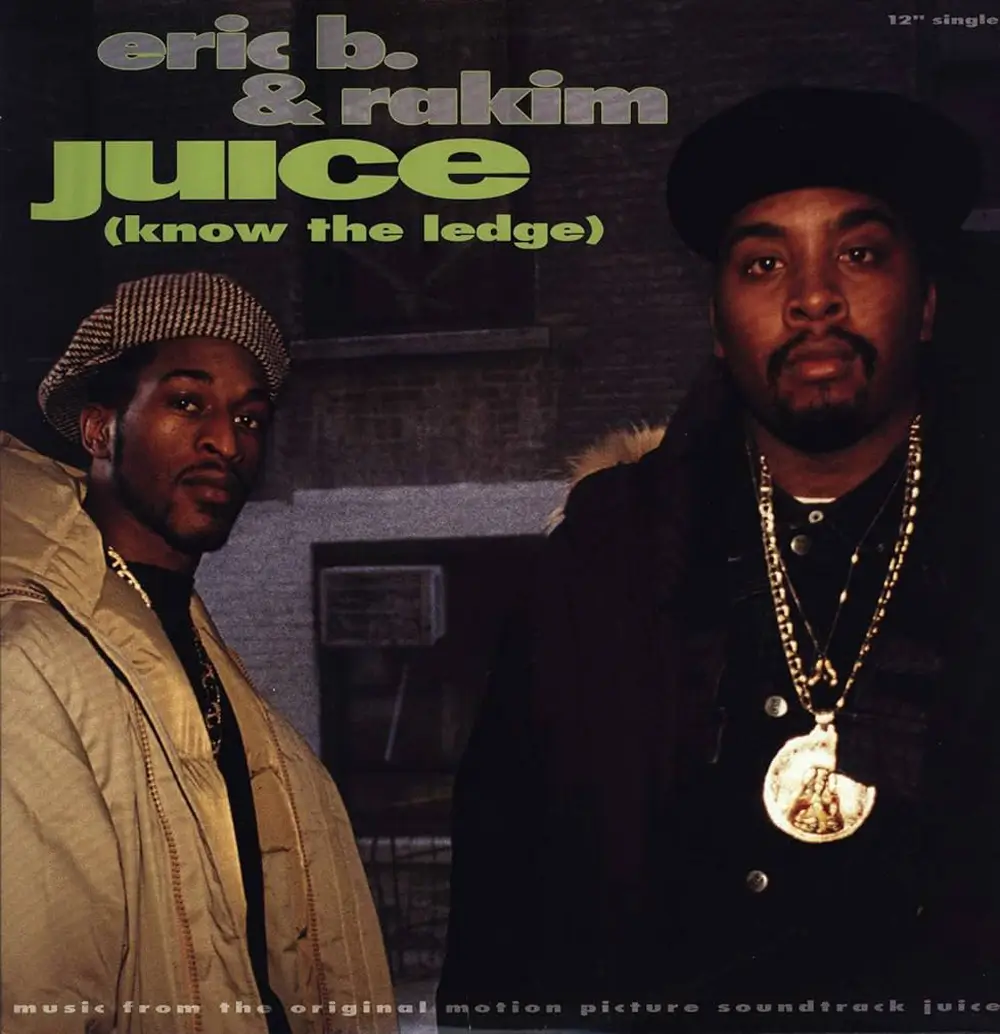
As you mentioned, “Juice” is particularly noteworthy for launching Tupac Shakur’s ‘Thug Life’ persona, which would later become a significant aspect of his musical career. The film’s soundtrack, featuring tracks from prominent artists of the time, added another layer of authenticity to the narrative and captured the energy and ethos of the era.
The relationship between Hip Hop and film has been mutually beneficial, with each medium influencing and elevating the other. The soundtracks of ‘hood films’ like “Juice” served as important cultural artifacts, reflecting the social and musical landscape of the time. It’s interesting to see how these collaborations contributed to the evolution of both Hip Hop and filmmaking during that period.
Eric B. & Rakim played a significant role in the soundtrack by co-starring on its title song. Similar to their impact with “Friends,” this collaboration marked another noteworthy moment for the duo. Interestingly, the spotlight wasn’t too intense for Rakim; instead, it was his lyrical prowess that infused the soundtrack with energy. Undoubtedly, when the “Juice” record dropped, the audience, already devoted believers in ‘The God MC,’ embraced it wholeheartedly.
The song’s subtitle, “(Know The Ledge),” cleverly plays on the word “knowledge” and incorporates Five-Percent terminology. This linguistic finesse adds depth to the song, showcasing the thoughtful and expected brilliance of ‘The God MC.’
“A brand new morn’, no time to yawn/Shower’s on, power’s on/Late for school, I catch the train/Girls sip the style and whisper my name/I push up like an exercise/Check their intellect and inspect the thighs/Select the best one, pull her to the side/Keep her occupied for the rest of the ride/Read her my résumé, she know already/Cool/Just meet me after school/We can moan and groan until your moms come home/And you’ll be calling me Al “Dope” Capone…
…Sweating me, she didn’t want to let me loose/Come get me, that’s if you want to sip the juice/’Cause the streets await me/So I take my gun off safety/Cause a lot of n***** hate me/Comin’ out of the building, they set me up/Sprayed with automatics, they wet me up/In a puddle of blood, I lay close to the edge/I guess I didn’t Know the Ledge…”
As the Golden Age of Hip Hop neared its conclusion, Rakim remained at the pinnacle of his lyrical prowess. Noteworthy releases like “Follow The Leader,” “Let The Rhythm Hit ’Em,” and hit singles such as “Friends” and “Juice (Know The Ledge)” solidified Rakim’s esteemed position among the genre’s premier lyricists.
However, the landscape of Hip Hop was undergoing rapid transformations. While high-level lyricism retained its value, other elements such as subject matter, the support system (comprising one’s neighborhood, crew, and rhyme affiliates), and a carefully curated image were emerging as the most valuable assets for an MC. In the changing dynamics of the rap game, as articulated in “Juice,” everyone was familiar with Rakim’s impeccable resume, but the question lingered: Did ‘The God MC’ truly comprehend the intricacies of the new rules governing Hip Hop?
Don’t Sweat the Technique
The title track of the album, “Casualties of War,” along with “Pass The Hand Grenade” and “The Punisher,” stands as compelling examples of Rakim’s formidable lyrical prowess. Even in tracks like “What’s On Your Mind,” where he maintains a seductive appeal for the ladies, Rakim manages to deliver sharp and relatable lyrics that resonate with true hip-hop enthusiasts.
“Teach the Children” is a noteworthy inclusion, showcasing Rakim’s ability to create a socially conscious record without coming across as preachy. In this track, he strikes a balance between delivering a powerful message and maintaining musicality, demonstrating his skill in addressing important issues within the context of his artistry.
While Rakim’s lyrical prowess remained intact, there was a discernible sense that he sounded somewhat less inspired. Admittedly, for devoted Rakim enthusiasts, such a statement might be deemed sacrilegious, but it reflects a personal perception. It’s important to clarify that even Rakim operating at 75% is superior to the very best performances of most MCs on a rare day. The concern wasn’t centered around Rakim’s emceeing abilities; instead, it seemed that the production played a pivotal role. The beats and samples, though competent, were deemed standard in the realm of Hip Hop, lacking the captivating essence that characterized the classic records from Rakim’s preceding three albums.
The release of “Don’t Sweat The Technique” didn’t result in a clear victory or defeat for Rakim, akin to Sugar Ray’s match against Terry Norris. The overall reception of the project felt more like a draw. Unlike Sugar Ray, Rakim believed he had more to offer, and in this case, most fans shared that sentiment.
While “Don’t Sweat The Technique” may not have reached the heights of greatness, it stood as a solid effort where Rakim’s distinctive flow remained a highlight. Unlike Sugar Ray Leonard, who retired from boxing after his loss to Norris, there was a unanimous sentiment among fans that Rakim still had more to contribute to the rap game.
However, it appeared as if Rakim had entered a kind of retirement, although the situation was more nuanced. A contract dispute with MCA, along with other personal issues, prevented Eric B. & Rakim from recording. This hiatus was not a voluntary retirement but a result of external factors that temporarily halted Rakim’s recording career.
The period following the split of Eric B. & Rakim marked a challenging second act for Rakim as a solo artist. His return with “The 18th Letter” in November 1997 faced the daunting task of navigating a changed landscape in the hip-hop arena. Similar to Sugar Ray Leonard’s overly confident comeback against Camacho, Rakim encountered younger and hungrier lyrical competitors aiming to make their mark.
The shift in hip-hop’s landscape since the days of “Don’t Sweat The Technique” was evident by 1997. The lyrical emphasis had diminished to some extent, with radio-friendly, style-heavy tracks overshadowing substance. Crossover rap and ‘gangsta’ narratives dominated the scene, with the West Coast and a rising Southern influence altering the genre’s dynamics.
Even within the East Coast, Rakim’s home ground, the sound had evolved. Five Percent theology, while still influential, had lost some resonance, especially outside the northeast. Rakim’s poetic brilliance in tracks like “The Mystery (Who is God)” off “The 18th Letter” showcased his continued commitment to intricate lyricism.
However, East Coast hip-hop had taken on a grittier tone, with street hustler narratives overshadowing regal rhyme-play. Rakim’s style and substance on “The 18th Letter” and its follow-up, “The Master” (1999), didn’t align seamlessly with the late ’90s hip-hop culture. Despite Rakim’s lyrical mastery, the projects didn’t stand out, and the lack of reinvention in musical production further contributed to a lukewarm reception.
The lukewarm reception continued with his third solo album, “The Seventh Seal,” released in 2009 after a ten-year hiatus. Despite Rakim’s enduring skill as the ‘God MC’ and master architect of rhymes, the project didn’t resonate strongly with the evolving tastes of the hip-hop audience, underscoring the challenges of maintaining relevance in a genre undergoing continuous reinvention.
Rakim, during his prime, excelled by playing to his lyrical strengths. However, in the evolving landscape of hip-hop, the impact of lyricism had its limitations. The audience’s appetite extended beyond intricate verses; they craved “club bangers” and vivid musical street narratives that transported them into a cinematic experience as they navigated the streets, immersed in the beats.
Rakim’s career trajectory demonstrated a lack of the strategic calculation that characterized his rhyme construction. His most significant misstep, in my opinion, was the gap between solo projects, notably evident in the decade-long hiatus between his last studio release with Eric B., “Don’t Sweat The Technique,” and his debut solo album, “The 18th Letter.” This lapse in active recording appeared to be his Achilles’ heel, hindering his connection with a rapidly changing hip-hop landscape.
Furthermore, Rakim’s solo approach, where he maintained minimal affiliations and guest appearances, may have contributed to the challenges he faced. Unlike many artists who thrived on collaborations, Rakim operated largely independently, with Eric B. being his primary association. The lack of visibility on mixtapes, limited guest appearances, and few MCs featuring on his projects could have accelerated the decline.
Rakim’s situation can be seen as a result of ‘God-like’ expectations that became impossible to meet. Factors such as a sporadic recording regimen, a changing hip-hop guard, and the fluctuating tastes of fans played a role in this decline. The contradictory nature of fans’ expectations, coupled with a fluid musical landscape, further complicated the task of living up to the monumental legacy built during his prime.

The Impact
Distinguishing between talents and gifts is crucial. As previously emphasized, being talented does not necessarily equate to being gifted. Talent denotes a notable proficiency in a particular skill, achieved through dedicated effort. However, even exceptionally talented individuals may fall short of achieving greatness.
Greatness is an exclusive classification reserved for those who attain exceptionally high levels of excellence in their respective fields. True greatness is a rare accomplishment, often overshadowed by its frequent and indiscriminate use to describe various individuals, places, and events.
On the other hand, gifts are divine endowments, bestowed by a higher power. Only a select few are privileged to possess such unique capabilities. A gift is intrinsic to its recipient, captivating observers with awe through their senses upon each encounter. Gifts are meant to be shared with the world—visible, audible, tangible, and even consumable.
However, possessing a gift does not confer superiority in a particular domain. Many gifts remain dormant, untouched by their recipients. Even when utilized, gifts often find themselves underappreciated, their divine purposes left unfulfilled.
‘The God MC,’ Rakim, stands as a divine gift to Hip Hop, elevating the art of emceeing to its purest form. In a transformative fashion, he not only raised the bar for rhyming but also assumed the role of the MC’s voice during a pivotal period in the evolution of Hip Hop, alongside Eric B. Rakim’s impact was profound, reshaping the culture with his impeccable flow, cadence, profound insights, authoritative tone, and extraordinary wordplay. His utilization of these elements fully harnessed the divine powers of his gift, earning him the moniker ‘The God MC.’
While acknowledging the groundbreaking contributions of pioneering MCs from the late ’70s and early ’80s in the creation of rap music, Rakim, in the author’s view, stands out for changing the game, particularly in terms of pure lyricism. The upcoming essays in the Lyrical Luminary series promise to give due recognition to these trailblazers, emphasizing their significant role in shaping the rap landscape.
Drawing an analogy to calligraphy, the author suggests that Rakim’s lyricism transcends basic rhyme-play. Like calligraphy, which is more than just ‘fancy’ penmanship and is revered as a supreme visual art form in certain cultures, Rakim’s approach to rhyming transformed it into an intricate and sophisticated art form. This comparison underscores the depth and artistic quality of Rakim’s lyricism, positioning him as a master craftsman in the ancient discipline of verbal expression.
[HipHopGoldenAge.com]

